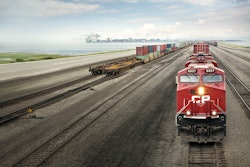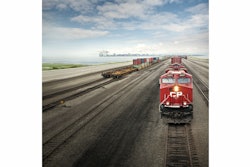There's trouble brewing in Canada over which "booming" industry, oil or food, will get to use more rail capacity to ship their goods. Grain shippers claim that the Canadian National Railway Company and the Canadian Pacific Railway focus on more lucrative oil transportation, while their silos sit filled to the brim with a record-high grain harvest.
Politicians have gotten involved as well, but the situation isn’t as simple as it seems thanks to cold weather and a locomotive shortage that’s adding to transport problems.
Regardless, the backlog has major implications for the world’s third-largest grain producer that sends 95 percent of exports to the United States.
“It’s frustrating that elevators and farmyard bins are filled to the rafters, literally,” said Alberta Agriculture Minister Verlyn Olson on a conference call with journalists last week. “At a time when our agriculture community should be reaping the rewards of one of the best crops in recent memory, we’re instead struggling just to get our product to the market.”
Indeed, it’s been a record-breaking year. Total production of wheat, barley, oats and corn in 2013 increased 29 percent since the year before to reach 65.8 million metric tons, according to a report from the USDA Foreign Agricultural Service.
The surplus has created a problem. Outstanding orders from shippers to railways have reached a record 55,000 cars this year, and more than 50 ships are docked at West Coast ports, waiting to fill up their holds.
Cold weather has also slowed things down, since fewer cars are added to each train when temperatures drop. For instance, the average temperature in Edmonton, Alberta, for February has been about -8 degrees Celsius (17.6 Fareinheit) which is two degrees lower than usual.
Though other commodities are also moving slowly, grain is especially affected since trains are the best method of moving it. Using trucks can cost up to $100 CAD more per metric ton.
The United States is the number one importer of Canadian oats, accounting for approximately 95 percent, according to the report. A weaker Canadian dollar and falling oil prices should, in theory, help boost the country’s grain exports.But how they leverage the opportunity hinges on how well they can transport the product.
“The consequences of not getting the crop out to its export markets in time are significant -- contract penalties, lost sales, demurrage costs and reduced grain prices for farmers,” the report reads.
It also affects animal farmers, who are now paying much more for the feed they require on a daily basis.
For months, politicians and the agricultural community have been lobbying the government to step in against the railway companies.
In December, Transport Minister Denis Lebel and Agriculture Minister Gerry Ritz unveiled a bill seeking to address complaints from grain handlers, miners and shippers who want better service from the Canadian National Railway Co. and Canadian Pacific Railway Ltd. With the new legislation, the railways would have a month to address concerns, or risk paying up to $100,000 in fines.
“There is an imbalance in the shipper-railway relationship,” said Lebel at a news conference.
On Tuesday, Ritz called on the Federal government to broker service agreements between companies and farmers.
“Right now [the railways] are allocating cars where the railways want them, not where grain companies need them, and that needs to change,” Ritz said to reporters at a conference the next day.
As the discussion progresses, railway companies have continually stated that they’re merely trying to do what they can to deal with an unprecedented amount of product.
“CN is doing its level-best to move this 100-year grain crop to export position and world markets,” said Mark Hallman, a representative of the Canadian National Railway Company.
He added that the record crop is nearly 20 million tons more than average.
“It carries an export potential by rail that is at least 50 percent larger than any other program in our history. No supply chain can realistically be geared up to handle so much product, with so little lead time,” said Hallman.
To read more, click HERE.



















